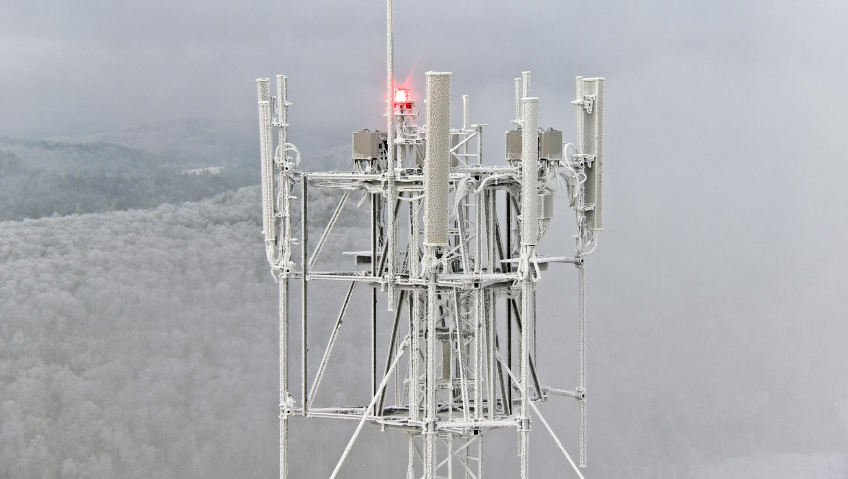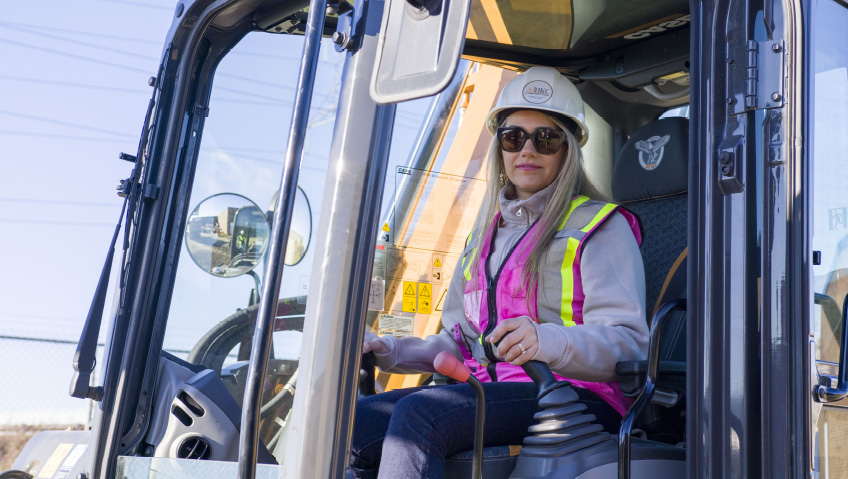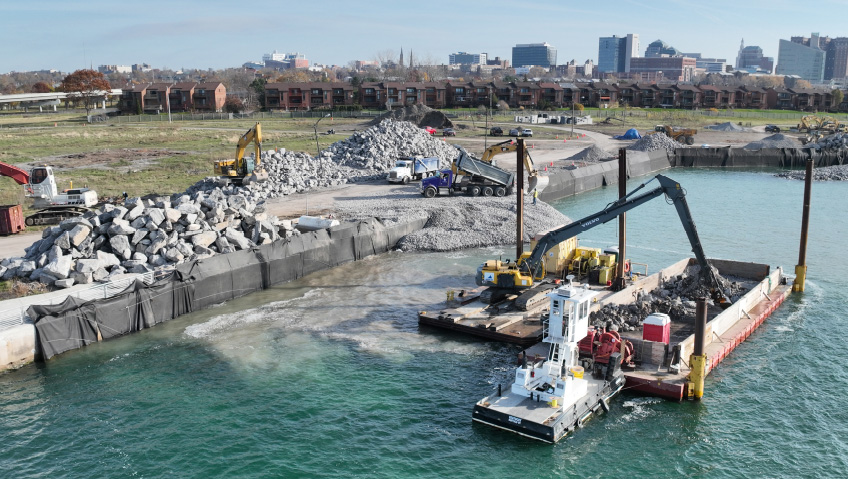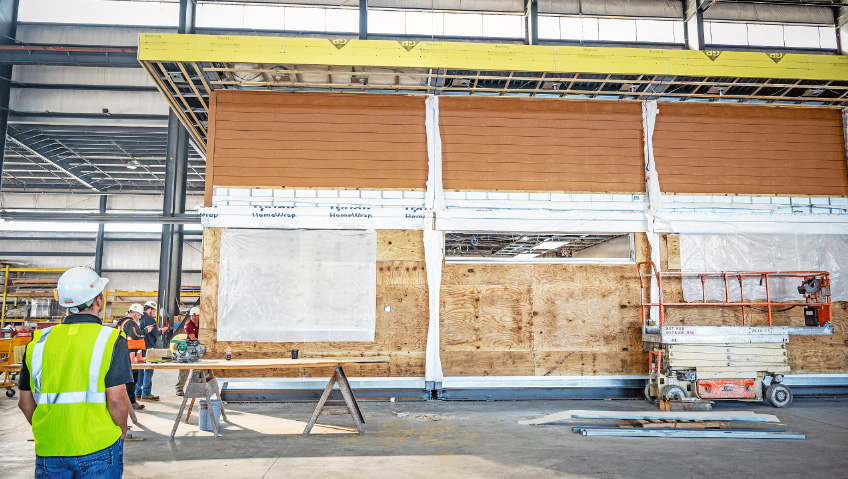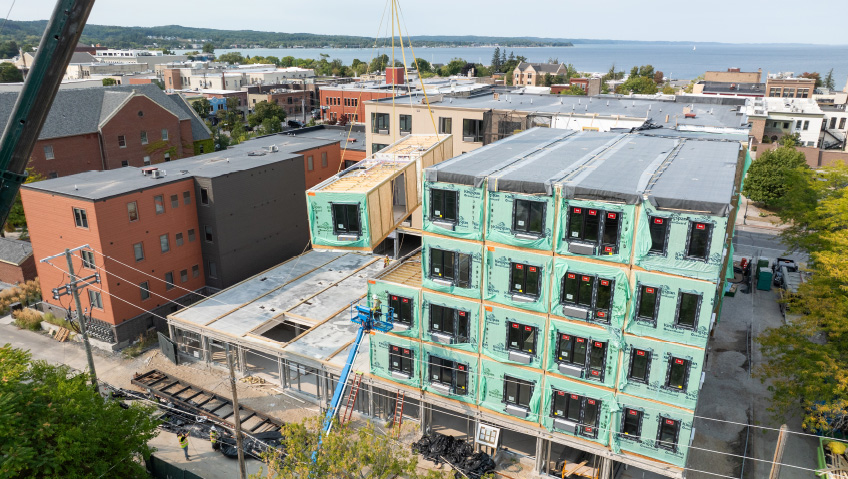Last year marked the twenty-fifth anniversary of Groupe Madysta, an innovative, vertically-integrated firm based in Trois-Rivières, Québec that specializes in engineering and construction work for the telecommunications sector. The companies within the fold offer a comprehensive suite of services, and the group’s one-stop shop approach has been highly successful. It is currently pondering new opportunities and expansion plans.
“We do projects from beginning to end,” so clients do not have to “hire two or three different companies to do the job,” explains Denis Ricard, Director of Human Resources.
If a client wants to establish a cell phone network in a remote area, in addition to setting up the telecom infrastructure, Groupe Madysta can construct transportation routes to the site. “We are able to build roads to access the sites where towers are erected. We do all the civil engineering associated with that,” says François Houde, Vice President of Business Development.
Groupe Madysta can install and replace telecom towers, transmission lines, antennas, and connectors, and put up protective fencing. The company excels at underground tasks as well, installing, testing, and maintaining buried fibre optic, co-axial, and copper lines. Its construction and roadwork services include excavation, road resurfacing, formwork, tree clearing, and building foundations.
While telecommunications work remains central, the group has branched out in recent years. New firms under the Groupe Madysta umbrella work in manufacturing steel components, air-conditioning, ventilation and heating, electrical services, and wired and wireless engineering, among other areas.
Whether the work is telecom-related or not, most “is done by our own crews. We are not doing a lot of sub-contracting,” says Houde.
Clients are centred in Québec, Ontario, and the Atlantic provinces, but the firm can take on assignments anywhere in Canada. “We’ve had some projects in Alberta. We hope to deploy across the country soon,” says Ricard.
Two companies in the group—Gesma Telecom and Madysta Constructions—have ISO 9001:2015 certification. While these two firms obtained ISO certification to meet client standards, every company operated by Groupe Madysta strives to achieve ISO-level benchmarks, says Ricard, adding that, “All internal processes about quality are the same, for all companies.”
Maintaining high standards is vital, given how the group does business. When a telecommunication project is announced by a government agency or private business, companies are typically invited to place bids to receive contracts, says Houde. To preserve the privilege of being invited to bid, firms like Madysta have to maintain the highest level of quality in their work. “If we have success today, it’s because our customers are confident we will do a quality job,” he states.
This confidence arises out of the core values of quality, health and security, and family spirit that all Groupe Madysta companies follow. “It’s really important for us to have an environment where people feel at home,” Ricard explains.
He says that the firm has no problem with employees taking time off to deal with family matters—say, taking a child to the hospital. In the best family tradition, Groupe Madysta encourages open communication among its staff, and management officials are available to anyone who wishes to speak with them. President and Chief Executive Officer Yvan St-Arnaud’s office, “is always open. Everyone can talk to him. There is no restriction about that.”
Groupe Madysta is also dedicated to keeping its workforce healthy and safe. A team working in the human resources department implements health and safety protocols across the entire company. Weekly meetings are held with project and field managers to discuss relevant issues, and there is constant communication with staff in the field via smartphones and tablets. In-person and online inspections are held regularly to ensure that workplaces are following safety rules.
“Sometimes, we do a virtual visit in the field. Everybody has a smartphone. We will do a virtual visit with the guys and say, ‘Okay, I would like to see the safety gate you put in place.’ Or, if there is a crane on the site, can I talk to the crane guy?” says Ricard.
There are also daily ‘tailgate meetings’ centred on risk analysis at work sites. Foremen and other officials review safety and answer questions related to safety issues before the shift starts for the day. These efforts complement training programs for new employees. New hires receive intensive training on health and safety issues prior to performing any work
When COVID struck, the telecommunications sector was deemed an essential service so Groupe Madysta could remain open. The company initiated a sweeping response to keep staff safe from the coronavirus. Masks and hand sanitizer were provided, and a health questionnaire was introduced for all staff entering company buildings at the start of their shifts. Office staff members who could work from home were encouraged to do so. Employees in the field were provided with permits, identifying the company and attesting to their required participation in support of essential services. A new communication program was put in place enabling the firm to email or text notices to staff en masse about health and safety measures.
In addition to its concern for employee well-being, the firm offers workers a group RRSP with employer contributions, deals on cell phone packages, insurance plans, and food and lodging coverage for workers in the field, among other benefits.
The company that became Groupe Madysta started in 1996 as Madysta Constructions Ltd. Madysta was focused from the start on construction and infrastructure projects for the telecommunications clients including Bell, Rogers, Telus and Videotron. Contracts with other prestigious clients like Canadian Broadcasting Corporation and Hydro-Quebec followed.
Over the years, Madysta Constructions expanded in size and scale. New companies were acquired or launched under the auspices of Groupe Madysta. Madysta Telecom was founded in 2010 to handle construction, maintenance, installation, and commissioning tasks at cellular network sites. Two years after that, Divem Electrique was launched to specialize in electrical work including lighting fixture repair and replacement, generator repair, electric power system maintenance, and power line installation.
DMC Climatisation was added to the fold in 2015. This company installs and supplies heating, ventilation and air conditioning systems, and performs inspections, servicing, maintenance, and emergency services. The integration of Mauricie Refrigeration in 2016 has come to add refrigeration expertise inside DMC.
Other Groupe Madysta companies include MDT Telecom, which provides technical services. MDT technicians can, amongst other things, handle installing and supplying fibre optic cables, network and power equipment. MDT Telecom also splices fibre optic and copper, performs installation and configuration, starts up LAN, WAN, and Wi-Fi networks, and performs verifications and testing.
Another firm called Acier St-Arnaud/ASA makes and develops steel components for construction projects. Meanwhile the engineering firm, Gesma Telecom, specializes in wired and wireless industries, performing field studies and inspections, preliminary and detailed engineering, load calculations, and more.
Given the prominence of telecommunications in modern life and constant upgrades in the sector, Groupe Madysta keeps a very busy schedule. When 4G wireless technology was introduced, “We did work on more than 800 sites in Eastern Canada in one year,” states Houde. “At the [peak] of this project, we had forty teams on the ground, with trucks, ATVs, trailers, and whatnot.”
“We are also doing a lot of activity for fibre network [installation] in Québec and other parts of Canada. There are big programs in Québec [and on the federal level] to deploy fibre to the home (FTTH) Internet networks. We are working on those big projects,” adds Ricard.
The number of workers across Groupe Madysta fluctuates, depending on work conditions. At the peak of the warm-weather construction season, the firm might employ up to four hundred people. Generally, there are around 200 to 250 employees.
Houde describes hiring people as the firm’s biggest non-COVID-related challenge. To fill its ranks, the group actively seeks new employees through newspaper and online ads and emails people graduating from training schools encouraging them to apply for jobs. The company also runs a new talent referral program which provides bonuses to current employees who bring qualified new staff to the company.
While enhancing its core services, Groupe Madysta is keeping an eye open for possible new acquisitions and growth areas. “We are looking at opportunities. I can’t add a lot on this one, but I can say we’re looking right now,” says Houde.
One plan involves the adult children of St-Arnaud and his wife, Manon Brodeur, a company co-owner and advisor. The two members of the next generation are currently completing MBAs at American schools and might be able to assist with the launch of a U.S. operation, says Brodeur.
Regardless of how things work out, Groupe Madysta retains a forward-looking spirit and is eager to keep growing. In five years, the company hopes to be well-established “in West Canada and the U.S. That’s where we want to go,” states Houde.
“And be done with COVID,” adds Brodeur—a wish with which every company in North America would likely agree.

